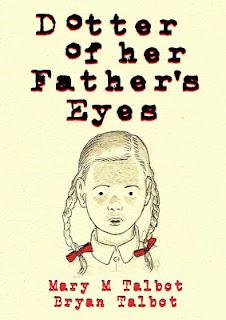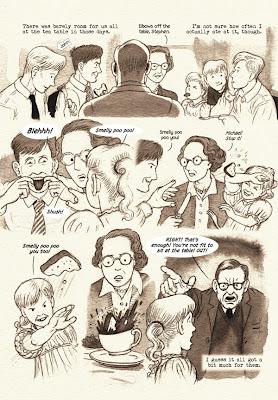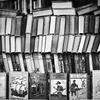Dotter of Her Father's Eyes by Mary and Bryan Talbot
Published: 2nd February, 2012
Publisher: Jonathan Cape Genre: Graphic Novel Format: E-Book
Pages: 96

Art
Cover Art: I think the cover is OK. It's nice and well-drawn but makes the book look more like a children's picture book than a Bryan Talbot creation. It wouldn't catch my eye in a bookshop but it's nice enough.
As you would expect of something illustrated by Bryan Talbot, this graphic novel has lovely artwork. It is detailed, expressive, and has a very sketchy and homely style compared to some of his other work:

In the panels depicting Mary's childhood, he mainly uses a palette made up of sepia tones and pastels and there is a lack of clarity in the drawings. I thought this was to reflect memory and distinguish these panels from Lucia Joyce's, which are more dramatic and in crisp black and white. Lucia's story has a more 'modern' feel which, since her Dad (James Joyce) was the Father of Modernism, seems appropriate!
Plot Synopsis
Part personal history, part biography, 'Dotter of Her Father's Eyes' contrasts two coming-of-age narratives: that of Lucia, the daughter of James Joyce, and that of author Mary Talbot, daughter of the eminent Joycean scholar James S. Atherton.
Other things to know about this book...
- The authors, Mary and Bryan Talbot, are husband and wife.
- It is based on the true life stories of Lucia Joyce (James Joyce's daughter) and Mary Talbot.
My Rating:

Review
This book was full of meh-ness for me. Before I'd even started reading, I wasn't a fan of the title. It seems really gimmicky and punny. However, I thought the book would make me like it despite a meh cover and a cringey title. Unfortunately, it didn't. In fact it is quite an unlikeable book in many ways.
Firstly, I felt that Mary interlinking her story with Lucia Joyce's was completely unnecessary. It just felt as though she was doing it because everyone else is doing it, as in many graphic novel autobiographies the author creates literary links or links to famous people. Some do it well, others don't. For me, this one didn't. The link was tenuous at best; if Mary's father hadn't been a James Joyce scholar then Lucia never would have been included in this story. Why not include more about Joyce himself rather than his daughter? It felt as though she were only placed in this novel because she was a woman who was young once...who had a father. She's not even particularly interesting...well, at least not in this story.
The main connection given on Mary Talbot's website as justification of Lucia's inclusion, is that they both had troubled relationships with their fathers. Mary certainly does. In fact, Mary's portrays her father as a complete villain, to the point where I actually found him extremely creepy and sinister. Particularly in one passage where he adopts a passive aggressive approach to Mary; she says she is trying hard at school and his reaction is, 'Mary is always trying. How true.' This leads Mary to realise, 'At some point, I started hearing sarcasm whenever he smiled'. To me, this is horribly sinister...parents that use power games and demeaning language to bully their children really get to me. I'm not sure if Mary meant to paint him as such a villain; I feel that she may have been going for a portrait of his character and forgot to put in any nice bits. Even the father in Alison Bechdel's 'Fun Home' who really did turn out to be a tad deranged doesn't come across as evil as Mary Talbot's father!
When it comes to Lucia Joyce's father, I found it difficult to reconcile the ignorant man in this book, with his narrow-minded views on women and uncaring attitude towards his family, with the man who could write such dense and complex works as 'Dubliners' and 'Ulysses', which represent nothing if not open mindedness. Would James Joyce really have said, 'It's enough if a woman can write a letter and hold an umbrella gracefully' or 'You're fine...as long as you know how to walk into a room properly'? I really hope not.
I mentioned Alison Bechdel before in comparison to this novel, and I really did feel that 'Dotter of Her Father's Eyes' in general was just a copycat of other autobiographical graphic novels. But where others such as 'Blankets', 'Persepolis', 'Maus' (the Art bits), 'Fun Home', 'American Born Chinese' etc etc, had other things going for them to make them more interesting, 'Dotter...' didn't really have anything else. I just found it quite bland in the way it didn't try and do anything different or have any real originality or flair, and wasn't even heartwarming or insightful which the other novels all did to perfection alongside their sad or harrowing bits.
I generally felt that this novel was too self pitying. Mary comes across as quite a spoilt child in my opinion, who has tantrums for no reason (just as her father does). I felt too often that she was writing passages to victimise herself and make herself look good or moral or intelligent, and I didn't like it. In most situations, Mary comes off looking like a very smart talking, wised up child who just irritated me. I wondered if maybe this was because she was writing with her husband, who found it really hard to make her look bad either because he loves her too much or because he's scared of her reaction if he does! Whatever the reason, it was hard to sympathise with such an 'I'm so perfect' character.
The last thing that annoyed me was the last section of the novel. The ending was completely rushed. It's like we had to sit through all the boring bits of Lucia's life and then skip right through all the juicy bits! Why and how did she get committed to a mental asylum? Where were her brothers? How did everyone feel? Why didn't they go back for her? It's so strange and left me feeling totally dissatisfied.
Despite all the negatives, there were things that I really liked about this graphic novel. I loved the art work...Bryan Talbot always delivers and where he is dramatic and bold in some of his other works such as 'Grandville', here he is soft and sepia which really suits the tone of the book. I loved the childbirth scene, which I felt was the only really funny and raw part of the book (it involves a midwife wielding a scalpel). I loved the illustrations of Lucia's dancing; all the ballet, modern and gymnastics...they were very beautiful.
I also loved some of the relationships in the book. Lucia and her mother was a particularly interesting one. Her mother is just awful and seems to want to degrade Lucia at every opportunity. She is spiteful and the epitome of bitter old hag. I felt that it was her fault that Lucia was committed to the hospital and I despised her for it. I liked this relationship as it incited really strong feelings towards both characters.
Bryan and Mary was another relationship I really liked. It was nice to see how they met and their hippy cool haircuts! Their reason for marriage is also quite amusing...not the most romantic! Their relationship felt very real and sweet and I loved how in the margins in some parts of this book Mary has written little notes to her husband about how he has got it wrong such as, 'Here you've drawn my mother in a frilly apron she wouldn't be seen dead in!' It made them seem like a very normal couple which I really liked.
Overall, this novel was a bit of a disappointment. Bryan's art is gorgeous, but the story lets it down. There is nothing new or original and it doesn't draw you in. I don't think it was necessary to include Lucia, as Mary and Lucia's lives were not really linked and Lucia's story was actually duller than Mary's! James Joyce hardly features, and when he does he is an ignoramus. I would recommend other Bryan Talbot books, but probably not this one.
Other Thoughts This Book has Inspired me to Read: Re-Read 'Alice in Sunderland' by Bryan Talbot. Three Words to Describe this Book: Pretty. Autobiographical. Soulless.

